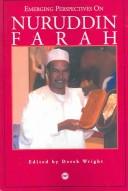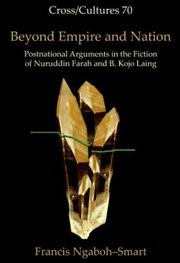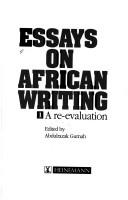| Listing 1 - 10 of 12 | << page >> |
Sort by
|
Article
Abstract | Keywords | Export | Availability | Bookmark
 Loading...
Loading...Choose an application
- Reference Manager
- EndNote
- RefWorks (Direct export to RefWorks)

ISBN: 0865439192 0865439184 Year: 2002 Publisher: Trenton, N.J. Africa World Press
Abstract | Keywords | Export | Availability | Bookmark
 Loading...
Loading...Choose an application
- Reference Manager
- EndNote
- RefWorks (Direct export to RefWorks)

ISBN: 9042009802 9004486488 Year: 2004 Publisher: Amsterdam : Rodopi,
Abstract | Keywords | Export | Availability | Bookmark
 Loading...
Loading...Choose an application
- Reference Manager
- EndNote
- RefWorks (Direct export to RefWorks)
Book
ISBN: 3927510858 Year: 2004 Publisher: Bayreuth : Universität Bayreuth,
Abstract | Keywords | Export | Availability | Bookmark
 Loading...
Loading...Choose an application
- Reference Manager
- EndNote
- RefWorks (Direct export to RefWorks)
Book
ISBN: 285816505X 9782858165056 Year: 2000 Volume: 7 Publisher: Toulouse: Presses universitaires du Mirail,
Abstract | Keywords | Export | Availability | Bookmark
 Loading...
Loading...Choose an application
- Reference Manager
- EndNote
- RefWorks (Direct export to RefWorks)
FARAH (NURUDDIN) --- MDA (ZAKES) --- COETZEE (JOHN MAXWELL), 1940 --- -OSUNDARE (NIYI), 1947 --- -CRITIQUE ET INTERPRETATION
Book
ISBN: 9781847010919 9781782042389 Year: 2014 Publisher: Woodbridge ; Rochester : James Currey,
Abstract | Keywords | Export | Availability | Bookmark
 Loading...
Loading...Choose an application
- Reference Manager
- EndNote
- RefWorks (Direct export to RefWorks)
The Somali novelist, Nuruddin Farah, is one of the most important African writers today. The central question that this book investigates is the relationship between modern identity and the novel as a genre. Nuruddin Farah's novels are shown by Moolla to encompass the history of the novel: from the 'proto-realism' of the acclaimed From a Crooked Rib to the modernism of A Naked Needle and the postmodernism of, most notably, Maps, returning almost full circle with his most recent novel Crossbones. Moolla examines his writing within the framework of Somali society and culture, Islamic traditions and political contexts, all of which are central themes in his work. She also addresses Farah's engagement with women's lives - his female characters and identities being at the heart of, rather than peripheral, to his stories - something that has distinguished him from many other male African writers. The book finally suggests that through his literary negotiation of the central contradiction of modern identity, Farah comes close to constituting a subject who no longer is transcendentally 'homeless', but finds a home 'everywhere' - a fitting project for a writer who has been in exile for the greater part of his life.
Book
ISBN: 1283158795 9786613158796 0230346987 0230119298 Year: 2011 Publisher: New York : Palgrave Macmillan,
Abstract | Keywords | Export | Availability | Bookmark
 Loading...
Loading...Choose an application
- Reference Manager
- EndNote
- RefWorks (Direct export to RefWorks)
"Islam in the Eastern African Novel engages the novels of three important eastern African novelists--Nuruddin Farah, Abdulrazak Gurnah, and M. G. Vassanji--by centering Islam as an interpretive lens and critical framework. Mirmotahari argues that recognizing the centrality of Islam in the fictional works of these three novelists has important consequences for the theoretical and conceptual conversations that characterize the study of African literature. The overdue and sustained attention to Islam in these works complicates the narrative of coloniality, the nature of the nation and the nation-state, the experience of diaspora and exile, the meaning of indigenaity, and even the form and history of the novel itself"--
Literature . --- Fiction. --- Islam. --- African literature. --- Postcolonial/World Literature. --- African Literature. --- Farah, Nuruddin, --- Gurnah, Abdulrazak, --- Vassanji, M. G. --- Criticism and interpretation. --- Africa, East --- Intellectual life. --- East African literature --- Islam in literature. --- African literature --- History and criticism.

ISBN: 9042007338 Year: 1998 Publisher: Amsterdam : Rodopi,
Abstract | Keywords | Export | Availability | Bookmark
 Loading...
Loading...Choose an application
- Reference Manager
- EndNote
- RefWorks (Direct export to RefWorks)
820 <100> --- 820 <100> Engelse literatuur: Commonwealth --- Engelse literatuur: Commonwealth --- Head, Bessie --- Kureishi, Hanif --- Lessing, Doris --- Narogin, Mudrooroo --- Ondaatje, Michael --- Australian drama --- Cross-culturalism --- Dabydeen (david) --- English literature --- Farah (nuruddin) --- King (thomas) --- Mason (bruce) --- New zealand culture --- Oral literature --- Pinnock (winsome) --- Warner (marina), 1946 --- -Head, Bessie --- -Australian drama --- Warner (marina), 1946-

ISBN: 0435917625 Year: 1993 Publisher: Oxford : Heinemann,
Abstract | Keywords | Export | Availability | Bookmark
 Loading...
Loading...Choose an application
- Reference Manager
- EndNote
- RefWorks (Direct export to RefWorks)
LITTERATURE AFRICAINE --- BA (MARIAMA) --- BRUTUS (DENNIS) --- FARAH (NURUDDIN) --- LOUTARD (JEAN BAPTISTE TATI) --- APARTHEID --- ACHEBE (CHINUA), 1930 --- -ARMAH (AYI KWEI), 1939 --- -COETZEE (JOHN MAXWELL), 1940 --- -HEAD (BESSIE), 1937-1986 --- LESSING (DORIS), 1919 --- -GORDIMER (NADINE), 1923 --- -NGUGI WA THIONG'O, 1938 --- -SOYINKA (WOLE), 1934 --- -HISTOIRE ET CRITIQUE
Book
ISBN: 0804773408 9780804773409 0804762368 9780804762366 9780804762366 0804762376 9780804762373 Year: 2010 Publisher: Stanford : Stanford University Press,
Abstract | Keywords | Export | Availability | Bookmark
 Loading...
Loading...Choose an application
- Reference Manager
- EndNote
- RefWorks (Direct export to RefWorks)
The resurgence of 'world literature' as a category of study seems to coincide with what we understand as globalization, but how does postcolonial writing fit into this picture? Beyond the content of this novel or that, what elements of postcolonial fiction might challenge the assumption that its main aim is to circulate native information globally? "The Long Space" provides a fresh look at the importance of postcolonial writing by examining how it articulates history and place both in content and form. Not only does it offer a new theoretical model for understanding decolonization's impact on duration in writing, but through a series of case studies of Guyanese, Somali, Indonesian, and Algerian writers, it urges a more protracted engagement with time and space in postcolonial narrative. Although each writer - Wilson Harris, Nuruddin Farah, Pramoedya Ananta Toer, and Assia Djebar - explores a unique understanding of postcoloniality, each also makes a more general assertion about the difference of time and space in decolonization. Taken together, they herald a transnationalism beyond the contaminated coordinates of globalization as currently construed.
Postcolonialism in literature. --- Transnationalism in literature. --- Space and time in literature. --- Literature, Modern --- Space and time as a theme in literature --- History and criticism. --- Harris, Wilson --- Farah, Nuruddin, --- Toer, Pramoedya Ananta, --- Djebar, Assia, --- Djebbar, Assia, --- Jabbār, Āsiyā, --- Imalhayene, Fatma-Zohra, --- Tur, Pramudya Ananta, --- Pramoedya Ananta Toer, --- Pramudya Ananta Tur, --- Po-a-nan-ta Tu-erh, --- Tu-erh, Po-a-nan-ta, --- Tur, Pramudya A. --- Pram, --- Nuruddin Farah, --- Harris, Theodore Wilson --- Waruk, Kona --- Criticism and interpretation. --- Postcolonialism in literature --- Space and time in literature --- Transnationalism in literature --- History and criticism --- Espace et temps --- Transnationalisme --- Littérature postcoloniale --- Dans la littérature --- Thèmes, motifs --- Espace et temps -- Dans la littérature --- Transnationalisme -- Dans la littérature --- Littérature postcoloniale -- Thèmes, motifs
| Listing 1 - 10 of 12 | << page >> |
Sort by
|

 Search
Search Feedback
Feedback About UniCat
About UniCat  Help
Help News
News